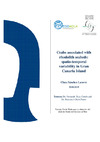Identificador persistente para citar o vincular este elemento:
https://accedacris.ulpgc.es/jspui/handle/10553/70461
| Título: | Crabs associated with rhodolith seabeds : spatio-temporal variability in Gran Canaria Island | Autores/as: | Sánchez Latorre, Clara | Director/a : | Tuya Cortés, Fernando José Otero Ferrer, Francisco |
Clasificación UNESCO: | 241705 Biología marina 240119 Zoología marina |
Palabras clave: | Rhodolites Brachyura Canary Islands |
Fecha de publicación: | 2019 | Resumen: | Rhodoliths are nodules of branching and unattached coralline red algae, whichform relatively stable three-dimensional structures, providing a relevant habitat for associated invertebrates. Crustaceans are a key component of the fauna living in rhodolith beds, despite patterns in their distribution and abundance remain largelyunknown. The overall objective of this study was to understand the spatio-temporal variability of crabs(Brachyura)associated with rhodoliths. In particular, rhodolith seabeds were seasonally studied at three depth strata (18, 25 and 40 m) through twosuccessiveyearsin Gran Canaria Island.Eight seasonal sampling campaigns were carried out, from December 2015 to October 2017. Samples were recolectedusing SCUBA at each of the three depth strata. Crabswere identified under a stereomicroscope, for a total of 808 individuals. The species Nanocassiope melanodactylusdominated the assemblage (ca.80% of the total abundance), withmorejuvenile individualslivingin deeper waters (40 m) than adults, which were more abundant at 18 m and 25 m depth.Ahigher richness of Brachyura was observed at 25 m,relative to 18 m and 40 m depth,wherecrabs foundan ideal habitat.The speciesPilmunus sp. followed this pattern, being more abundant at 25 m and almost absent at 18mand 40 m. Nevertheless,Pisa carinimana and Achaeus sp. did not show any spatio-temporal pattern.This study has shown, therefore, that certain crab species associated with rhodolith seabeds are bathymetrically segregated. The larger abundance and richness of crabs at 25 m correlated with the biomass of epiphytic algae attached to rhodoliths, which therefore seem to provide food and refuge for crabs | Departamento: | Departamento de Biología | Facultad: | Facultad de Ciencias del Mar | Titulación: | Grado en Ciencias del Mar | URI: | https://accedacris.ulpgc.es/handle/10553/70461 |
| Colección: | Trabajo final de grado |
En el caso de que no encuentre el documento puede ser debido a que el centro o las/os autoras/es no autorizan su publicación. Si tiene verdadero interés en el contenido del mismo, puede dirigirse al director/a o directores/as del trabajo cuyos datos encontrará más arriba.
Vista completaVisitas
88
actualizado el 10-ene-2026
Descargas
43
actualizado el 10-ene-2026
Google ScholarTM
Verifica
Comparte
Exporta metadatos
Los elementos en ULPGC accedaCRIS están protegidos por derechos de autor con todos los derechos reservados, a menos que se indique lo contrario.
